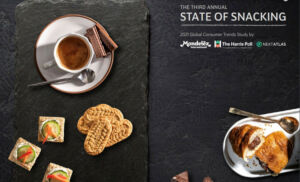
Snacking is preferred over traditional eating occasions for the third consecutive year, according to the consumer trends study published by Mondelēz International. The company issued its annual State of Snacking report on year-over-year insights into how consumers make snacking decisions. This year’s report shows mindfulness and well-being considerations are increasingly important in snacking.
The report also confirms that 64% of consumers prefer snacking as a regular eating behavior over traditional mealtimes for the third consecutive year, a 5% increase since the 2019 study. This is true especially among younger generations: as many as 75% of Gen-Z consumers are replacing at least one meal each day with a snack.
Polls were conducted among thousands of consumers in 12 countries for the report, in partnership with The Harris Poll. Its results reiterate how snacking is growing in everyday lives. Key findings include:
The definition of snacks has expanded: nearly 80% of consumers say their definition of a snack has evolved to include more or different types of foods, occasions for eating, or other elements.
Snacking reaches beyond nutrition: 85% of consumers eat at least one snack per day for indulgence, 88% say a balanced diet can include a little indulgence, and 74% say they can’t imagine a world without chocolate.
Purchasing decisions factor in personal values: 85% of consumers worldwide want to buy snacks from companies offsetting their environmental footprint.
Snacking experiences literally feed off of networking: more than half of the people polled say social media has inspired them to try a new snack over the past year.
Furthermore, consumers are seeking snacks that deliver a range of benefits beyond physical well-being and nutrition needs. Consumers’ habits indicate both sustenance and indulgence are part of a balanced lifestyle, with 85% of consumers now eating at least one snack for sustenance and one snack for indulgence each day. Additionally, snacking continues to serve as a vehicle for emotional well-being, with 79% of global consumers agreeing that some snacks should be just for enjoyment or satisfaction, without worrying too much about nutrition. Mindfulness and values-centric consumption also are increasingly top of mind, as 86% of consumers believe in the importance of control over their snacking choices through portion size options and ingredient transparency.
“Our State of Snacking report found that the definition of snacking is evolving among consumers globally, which is reshaping the meaning of snacking within people’s lives,” said Dirk Van de Put, Chairman and CEO of Mondelēz International. “Snacking is much more than a source of nutrition and indulgence; it also is a source of social connection and inspiration for broadened experiences. Notably, consumers continue to prefer snacking occasions throughout the day over traditional mealtime – as this growing behavior, accelerated by the ongoing pandemic, increasingly becomes part of daily life. That’s why we are proud to continue offering the right snack, for the right moment, made the right way.”
Additional findings from the 2021 State of Snacking report include:
Seeking snacks on demand
Consumers are experimenting with new channels to buy snacks: 53% of them have bought snacks using at least three nontraditional or emerging channels in the last year, including delivery apps, online ordering for curbside or in-store pickup, and direct-to-consumer websites.
Most consumers worldwide expect to be able to buy the snacks they want whenever they want (80%) and use any channel they want (74%). This trend is especially strong in Asia and Latin America.
Snacking with a purpose
Consumers are growing more intentional about their purchasing decisions as they become more in touch with their values. They are making more of an effort to learn more about the brands or companies they buy from and becoming more discerning over the sustainable nature of the snacks they choose, the study finds.
Reducing waste is top of mind, as 78% of consumers say the number one environmental impact on their food choices is the availability of low waste packaging.
Social media as a snacking inspiration
Social media is a rising source of discovery as consumers increasingly find food trends and inspiration on their feeds. On average, 55% of global consumers say social media has inspired them to try a new snack in the past year. Bu age groups, the ratio is even higher, with 70% Gen Zs and 71% millennials who share this habit.
“Consumers are becoming more discerning with their snacking choices as the trend toward conscious consumption grows, and we continue to find that balanced diets now often include a little indulgence for the majority,” continued Van de Put. About Mondelēz International
This survey was conducted online by The Harris Poll on behalf of Mondelēz International from October 5-27, 2021, among 3,055 adults globally ages 18 and older. The research spanned 12 markets: The United States (n=254), Canada (n=255), Mexico (n=256), Brazil (n=255), France (n=255), Germany (n=255), The United Kingdom (n=251), Russia (n=255), China (n=257), India (n=253), Indonesia (n=254), and Australia (n=255).



